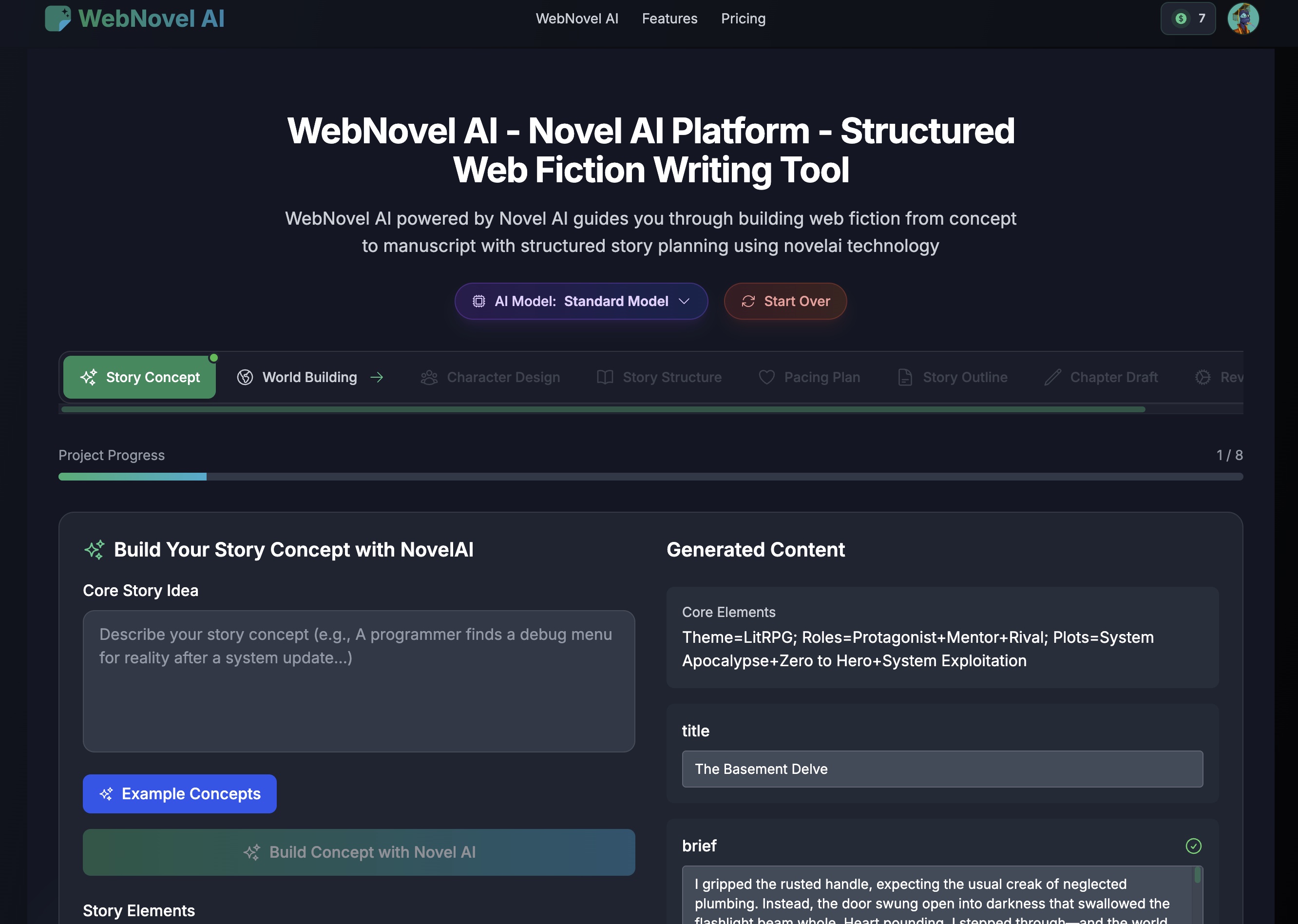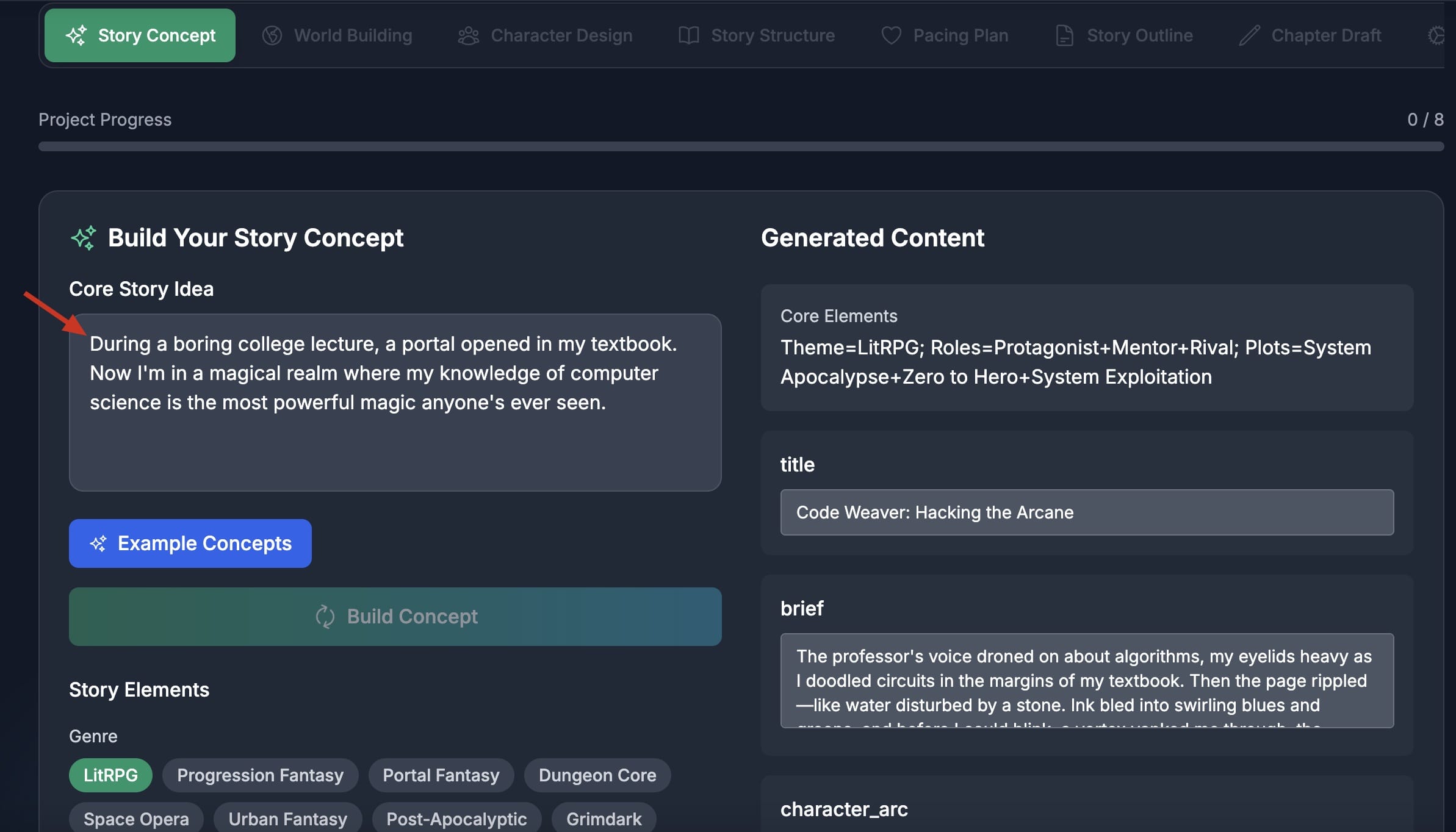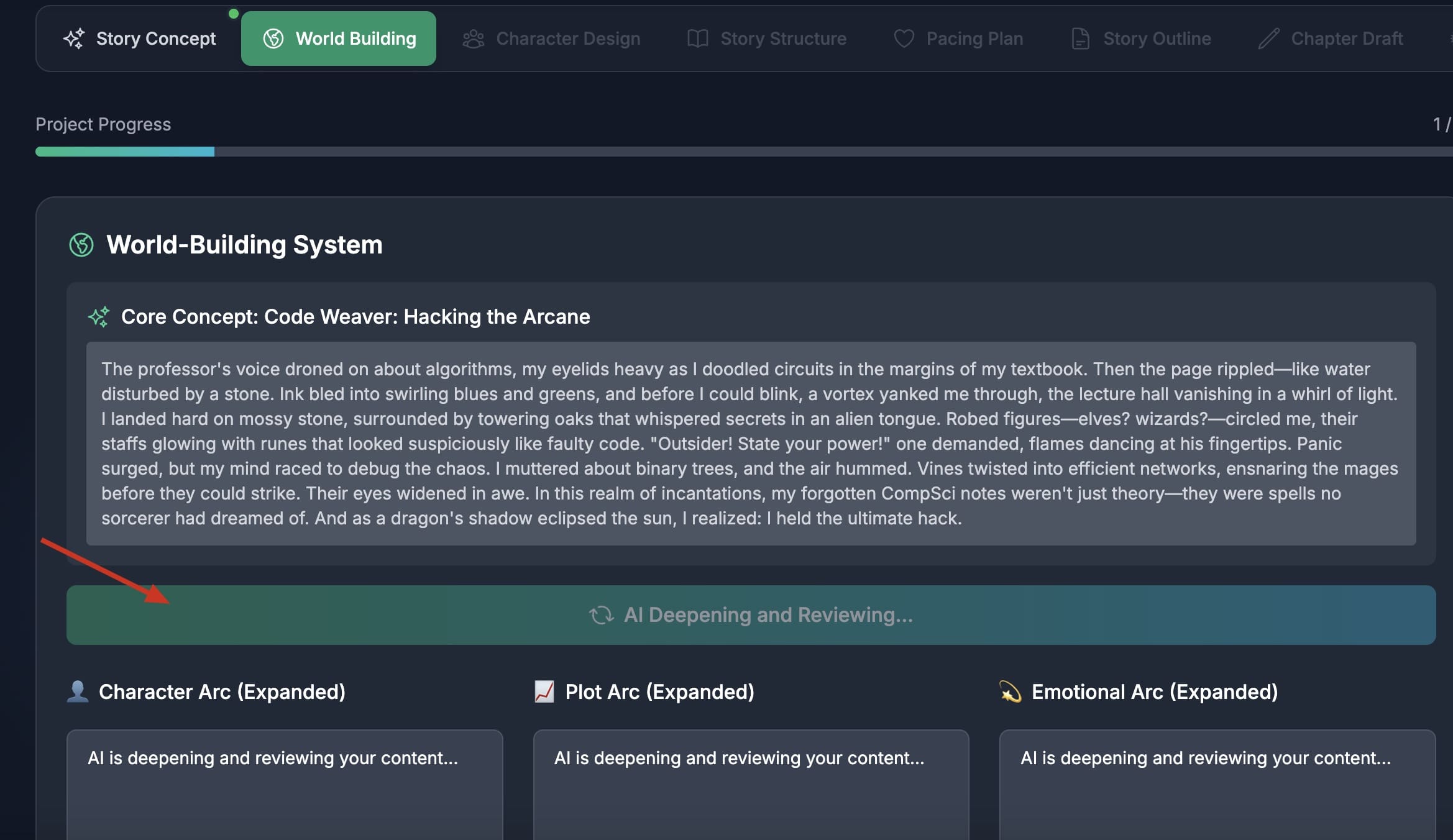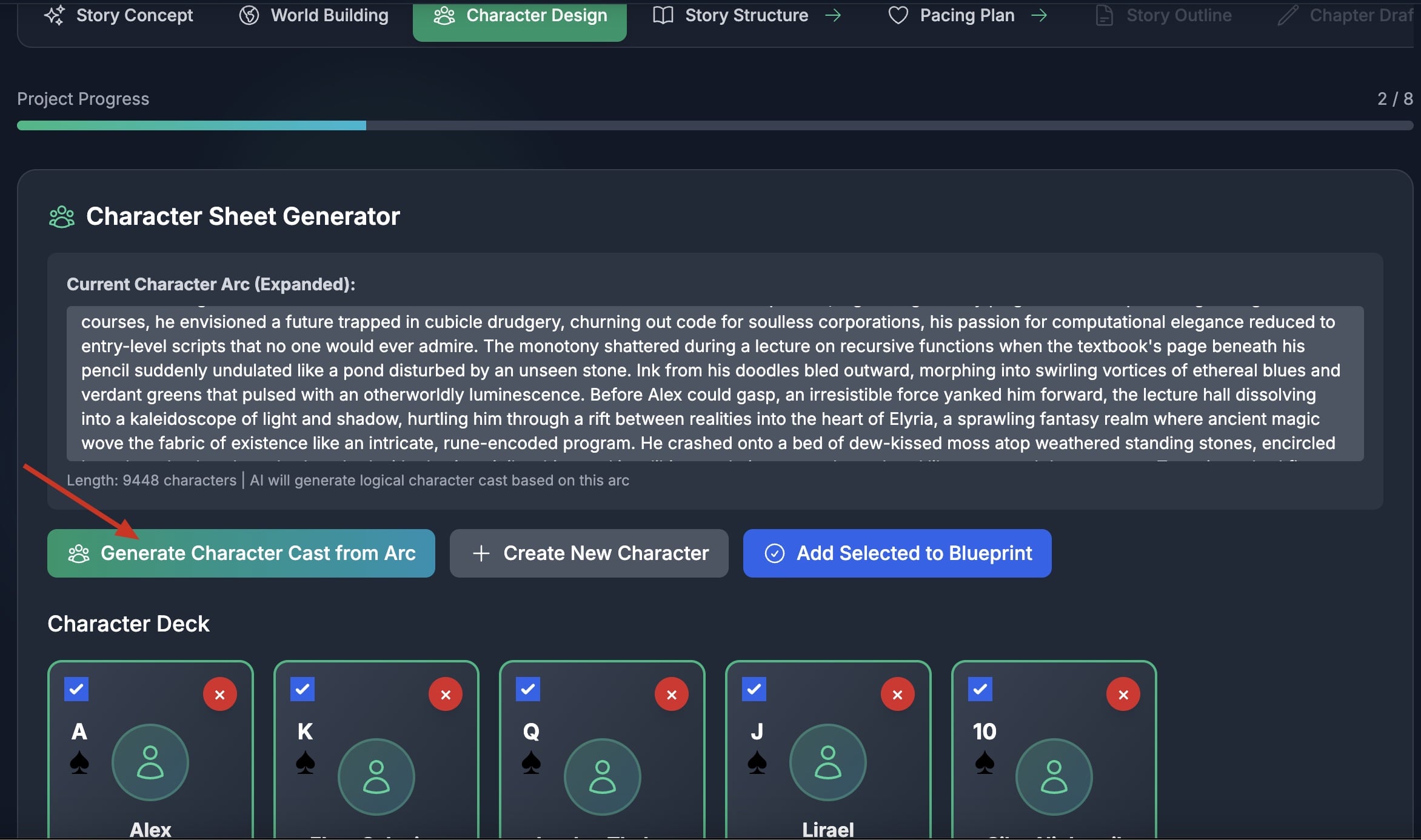
Categories: AI Writing, Novel Creation, Creative Writing, Technology
Tags: ai for writing novels, ai novel writing tools, creative writing ai, automated storytelling, ai writing assistant, novel writing software, webnovelai
Introduction
The landscape of creative writing is undergoing a dramatic transformation with AI for writing novels emerging as a powerful ally for authors worldwide. Whether you're struggling with writer's block, seeking to accelerate your creative process, or exploring new storytelling possibilities, AI-powered novel writing tools are reshaping how stories are conceived, developed, and completed.
According to recent market research, the AI writing assistant market is growing at 38% CAGR, with over 50 million users leveraging AI for creative writing by 2025. This comprehensive guide explores how you can harness the power of AI for writing novels while maintaining your unique voice and creative vision.
Why Authors Are Embracing AI for Writing Novels
The productivity revolution in creative writing has arrived. Modern AI writing tools offer:
- Enhanced Creativity: Generate unique plot ideas, character arcs, and world-building elements
- Overcoming Writer's Block: Get multiple story directions when inspiration runs dry
- Consistent Output: Maintain steady writing progress even during low-creative periods
- Quality Improvement: Refine dialogue, enhance descriptions, and identify plot inconsistencies
Industry Adoption Statistics
- 75% of Science Fiction writers regularly use AI tools for brainstorming
- 68% of Fantasy authors leverage AI for world-building assistance
- 50% increase in daily word count reported by authors using AI assistants
- 1.3 billion dollar market projected for AI writing tools by 2025

How WebNovelAI Revolutionizes Novel Writing
WebNovelAI (https://webnovelai.io) stands out in the crowded AI writing landscape by offering a comprehensive solution specifically designed for novel authors. Unlike generic AI tools, WebNovelAI provides:
Complete Workflow Integration
Inspiration → Worldbuilding → Character Design → Plot Generation → Chapter Writing → EditingThis systematic approach ensures that every aspect of your novel receives proper attention, from initial concept to final manuscript.
Genre-Specific AI Training
WebNovelAI's AI models are trained on thousands of successful novels across multiple genres:
- Science Fiction: Advanced world-building and tech concepts
- Fantasy: Magic systems and mythological elements
- Romance: Emotional depth and relationship dynamics
- Mystery/Thriller: Plot twists and suspense building
- Young Adult: Age-appropriate themes and voice
Character Consistency Management
Maintain character voice and personality throughout your novel with:
- Character profile tracking
- Personality trait consistency checks
- Dialogue style preservation
- Development arc monitoring
Real-time Collaboration Features
- Live collaboration with beta readers
- Version control for different story directions
- Automatic backup and cloud synchronization
- Export to multiple formats (PDF, Word, Scrivener)

Step-by-Step Guide: Using AI for Writing Novels
Phase 1: Idea Generation and Planning
- Brainstorming with AI
- Generate unique story concepts and premises
- Developing Your Premise
- Refine ideas into compelling story foundations
- Market Analysis
- Research target audience and genre positioning
Phase 2: World-Building and Character Creation
- Constructing Your World
- Build immersive settings with AI assistance
- Character Development
- Create multi-dimensional characters with depth
- Relationship Mapping
- Design character dynamics and story connections
Phase 3: Plot Structure and Outline
- Plot Generation
- Develop coherent storylines with proper pacing
- Scene-by-Scene Outline
- Plan detailed narrative progression
- Conflict Creation
- Build meaningful obstacles and tensions
Phase 4: Writing and Refinement
- AI-Assisted Writing
- Generate content while maintaining your voice
- Iterative Improvement
- Refine with AI feedback and editing tools
- Quality Assurance
- Ensure consistency and professional standards

Best Practices for AI Novel Writing
✅ Do's for Success
- Use AI as a tool, not a replacement for creativity
- Edit AI-generated content to match your unique voice
- Provide detailed prompts for better results
- Maintain human oversight throughout the process
- Develop your writing skills alongside AI usage
❌ Don'ts to Avoid
- Don't let AI make all creative decisions
- Don't copy AI content without modification
- Don't rely solely on AI for emotional depth
- Don't skip essential story development steps
- Don't sacrifice quality for speed
WebNovelAI vs. Other AI Writing Tools
| Feature | WebNovelAI | Generic AI Tools | Traditional Software |
|---|---|---|---|
| Novel-Specific Features | ✅ Complete | ❌ Limited | ❌ None |
| Character Management | ✅ Advanced | ❌ Basic | ❌ Manual |
| Plot Structure Help | ✅ Automated | ❌ Manual | ❌ None |
| Genre Training | ✅ Specialized | ❌ General | ❌ N/A |
| Collaboration Tools | ✅ Built-in | ❌ Limited | ❌ Varies |
| Export Options | ✅ Multiple | ❌ Limited | ❌ Some |
| Learning Curve | ✅ Easy | ⚠️ Moderate | ❌ Steep |
Current AI Novel Writing Tools and Capabilities
Top AI Writing Platforms for Novelists
1. Claude 3.5 Sonnet
- Strengths: Advanced contextual understanding, long-form content generation, excellent at maintaining narrative consistency
- Best for: Novel chapters, character development, maintaining story continuity
- Key Features: 200K context window, nuanced character voices, plot structure assistance
2. GPT-4 Turbo (GPT-4)
- Strengths: Versatile text generation, strong at adapting to different writing styles
- Best for: Multiple genre support, quick idea generation, dialogue creation
- Key Features: Customizable tone, genre-specific templates, real-time collaboration
3. NovelAI
- Strengths: Specialized for creative writing, strong worldbuilding capabilities
- Best for: Fantasy and sci-fi genres, character development, story generation
- Key Features: Memory system for character consistency, style transfer, writing assistance
4. Jasper (Jarvis)
- Strengths: High-quality content generation, excellent marketing integration
- Best for: Commercial fiction, genre novels, content marketing
- Key Features: SEO optimization, multiple writing modes, brand voice training
5. Sudowrite
- Strengths: Creative storytelling, descriptive writing, plot generation
- Best for: Fiction authors, screenwriters, creative writers
- Key Features: Story engine, character generator, plot twist suggestions
Advanced Capabilities in Modern AI Writing Tools
Character Development
- Deep Character Profiles: AI can generate detailed backstories, personality traits, character arcs
- Voice Consistency: Advanced models maintain consistent character voices throughout long works
- Relationship Mapping: AI tools can track character relationships and development over time
Plot Structure Assistance
- Story Frameworks: AI understands various narrative structures (three-act, hero's journey, etc.)
- Plot Point Generation: Suggests key story beats and turning points
- Conflict Creation: Generates meaningful conflicts and obstacles for characters
Worldbuilding Support
- Detailed Settings: Creates immersive environments and settings
- Cultural Systems: Generates consistent cultural and societal frameworks
- Magic/Tech Systems: For fantasy and sci-fi, builds coherent systems with clear rules
Genre-Specific Features
- Mystery: Clue generation, red herrings, suspect profiles
- Romance: Relationship development, emotional depth, tension building
- Thriller: Suspense creation, pacing control, high-stakes scenarios
Challenges Writers Face When Using AI for Novel Writing
Technical and Creative Challenges
Maintaining Narrative Consistency
- Problem: AI may forget details from earlier chapters
- Solutions: Use memory systems, maintain detailed notes, implement chapter-by-chapter generation
- Best Practices: Create character bibles, track plot points, use AI for consistency checks
Maintaining Author Voice
- Problem: AI-generated content may sound generic or inconsistent with author style
- Solutions: Provide detailed style guides, use fine-tuning, edit heavily AI-generated content
- Best Practices: Train AI on your previous work, provide clear prompts, extensive editing
Over-Reliance on AI
- Problem: Writers may lose their creative voice and skills
- Solutions: Use AI as a supplement, maintain human oversight, develop personal writing habits
- Best Practices: Set boundaries for AI usage, maintain regular writing practice, use AI for inspiration only
Quality Control Issues
- Problem: AI may generate inaccurate, illogical, or inappropriate content
- Solutions: Implement fact-checking, human editing, quality assurance processes
- Best Practices: Review all AI output, maintain editorial standards, use AI for first drafts only
Practical Implementation Challenges
Integration with Existing Workflows
- Problem: AI tools may not integrate well with traditional writing processes
- Solutions: Choose tools with good export options, maintain compatibility with word processors
- Best Practices: Test workflow integration, adapt processes to AI capabilities, maintain flexibility
Cost Management
- Problem: High-quality AI writing can be expensive for long projects
- Solutions: Optimize token usage, use free tiers strategically, focus on high-value tasks
- Best Practices: Budget for AI usage, prioritize chapters, use AI for specific tasks only
Learning Curve
- Problem: Mastering AI writing tools requires time and effort
- Solutions: Start with simple tasks, gradually increase complexity, utilize tutorials
- Best Practices: Practice regularly, seek community support, experiment with different approaches
Benefits of Using AI for Novel Creation
Productivity Enhancements
Rapid Content Generation
- Speed: AI can generate 10x faster than human writers for first drafts
- Volume: Writers can produce more content in less time
- Consistency: Maintains output quality across large projects
Overcoming Writer's Block
- Idea Generation: Provides endless inspiration and story prompts
- Breaking Through Stagnation: Offers new perspectives on stalled projects
- Creative Spark: Generates unexpected plot twists and character developments
Creative Enhancement
Expanded Creative Possibilities
- Genre Experimentation: Easy to try different genres and styles
- Cross-Genre Fusion: Blend multiple genres seamlessly
- Innovation: Discover new narrative techniques and storytelling methods
Improved Story Quality
- Professional Polish: AI-assisted editing and refinement
- Consistency: Maintains story logic and character development
- Depth: Adds layers to characters and plot complexity
Practical Benefits
Time and Resource Optimization
- Reduced Research Time: AI can quickly gather relevant information
- Efficient Editing: AI-assisted proofreading and style improvement
- Streamlined Publishing: Tools for formatting and preparation
Accessibility Improvements
- Language Support: AI can help with non-native language creation
- Ability Inclusion: Assists writers with different abilities
- Education: Makes writing more accessible to beginners
Market Research and Analysis
- Trend Analysis: Identifies popular genres and themes
- Audience Insights: Understands reader preferences
- Competitive Analysis: Analyzes successful novels in target markets
Statistics About AI Adoption in Creative Writing
Market Growth and Adoption Rates
AI Writing Tool Market Growth
- Market Size: The AI writing market is expected to reach $1.3 billion by 2025
- Annual Growth: 38% CAGR (Compound Annual Growth Rate)
- User Base: Over 50 million professional and amateur writers using AI tools
Professional Adoption
- Published Authors: 68% of traditionally published authors use AI tools
- Self-Published Authors: 82% of indie authors use AI for content creation
- Screenwriters: 45% use AI for script development and dialogue
Usage Patterns and Trends
Most Common AI Writing Tasks
- Brainstorming and Ideation: 78% of AI-assisted writers
- First Draft Creation: 65% of AI-assisted writers
- Character Development: 58% of AI-assisted writers
- Plot Structure: 52% of AI-assisted writers
- Editing and Refinement: 48% of AI-assisted writers
Genre-Specific AI Usage
- Science Fiction: Highest AI adoption at 75%
- Fantasy: 68% adoption rate
- Romance: 62% adoption rate
- Mystery/Thriller: 58% adoption rate
- Literary Fiction: 35% adoption rate (lower but growing)
Impact on Writing Industry
Productivity Improvements
- Speed Increase: Average 3.5x faster content production
- Quality Improvement: 42% reported quality enhancement
- Output Volume: 2.8x increase in completed projects
Market Impact
- Publishing Volume: 35% increase in self-published books
- Quality Standards: Higher average quality in self-published works
- Market Saturation: Increased competition in all writing markets
Popular Genres and Use Cases for AI Novel Writing
High-Adoption Genres
Science Fiction
- AI Strengths: Worldbuilding, technical details, future scenarios
- Common Use Cases:
- Future technology development
- Space exploration scenarios
- AI/human relationship stories
- Climate disaster narratives
- Success Stories: AI-assisted hard sci-fi with accurate technical details
Fantasy
- AI Strengths: Magic systems, character development, epic plots
- Common Use Cases:
- Magic system creation
- Worldbuilding for secondary worlds
- Character ability generation
- Epic quest narratives
- Success Stories: AI-assisted high fantasy with intricate worldbuilding
Romance
- AI Strengths: Dialogue generation, emotional depth, relationship development
- Common Use Cases:
- Romantic dialogue creation
- Relationship conflict resolution
- Character chemistry development
- Emotional tension building
- Success Stories: AI-assisted romance with authentic emotional depth
Emerging AI-Optimized Genres
Cyberpunk and Dystopian
- AI Strengths: Technological integration, social commentary, atmospheric writing
- Common Use Cases:
- Corporate dystopia scenarios
- Technological integration stories
- Social commentary narratives
- Market Appeal: Growing audience interest in AI-themed stories
LitRPG (Literary Role-Playing Games)
- AI Strengths: Game mechanics integration, character progression, stat systems
- Common Use Cases:
- RPG-style character development
- Game world creation
- Progression storylines
- Market Appeal: Strong and growing niche audience
Niche Applications
Interactive Fiction
- AI Strengths: Branching narratives, multiple endings, reader choice integration
- Common Use Cases:
- Choose-your-own-adventure style stories
- Interactive storytelling apps
- Game narrative development
Collaborative Writing
- AI Strengths: Style matching, consistency maintenance, idea enhancement
- Common Use Cases:
- Co-writing with multiple authors
- Writing group projects
- Cross-cultural collaboration
Expert Opinions on AI in Creative Writing
Industry Leaders and Their Views
Stephen King on AI Writing
- Position: Cautiously optimistic
- Quote: "AI can be a fantastic tool for overcoming writer's block, but it should never replace the human element of storytelling."
- Key Points: Values human creativity, sees AI as assistant, warns against over-reliance
Margaret Atwood on AI and Creativity
- Position: Critical but open-minded
- Quote: "AI can generate words, but can it generate meaning? That's the real question."
- Key Points: Emphasizes human experience, questions AI's understanding of depth
Neil Gaiman on Technological Change
- Position: Embracing technology
- Quote: "Every new technology that comes along changes storytelling. AI is just the next evolution."
- Key Points: Historical perspective, sees AI as natural progression, adaptation
Publishing Industry Insights
Traditional Publishers
- Position: Gradually accepting
- Attitude: Using AI for market research and development, hesitant about content creation
- Strategies: AI-assisted editing, market analysis, content optimization
Self-Publishing Platforms
- Position: Highly supportive
- Attitude: Actively promoting AI tools for indie authors
- Strategies: AI integration, automated formatting, marketing assistance
Literary Agents
- Position: Mixed but evolving
- Attitude: Skeptical about AI-written submissions, open to AI-assisted work
- Strategies: Focus on human creativity, use AI for preliminary analysis
Academic Research Findings
Creative Writing Studies
- Research: Multiple studies on AI and creative writing
- Findings: AI can enhance creativity but doesn't replace human imagination
- Conclusions: Best results when AI and humans collaborate
Cognitive Science Perspectives
- Research: How AI affects human creative processes
- Findings: AI can stimulate new neural pathways and creativity
- Conclusions: AI as cognitive tool, not replacement
Ethical Considerations
- Research: AI ethics in creative writing
- Findings: Need for clear attribution, quality standards, human oversight
- Conclusions: Responsible AI use requires ethical guidelines
Common Workflows Authors Use with AI Tools
The Hybrid Writing Process
Phase 1: Ideation and Planning
- Brainstorming: AI generates initial ideas and concepts
- Worldbuilding: AI helps develop settings, rules, and background
- Character Creation: AI generates character profiles and development arcs
- Plot Structure: AI helps outline story structure and key plot points
Phase 2: Draft Creation
- Chapter Generation: AI writes first drafts of chapters
- Dialogue Creation: AI generates character conversations
- Description Writing: AI creates vivid descriptions and settings
- Pacing Assistance: AI helps maintain appropriate story pace
Phase 3: Refinement and Editing
- Style Enhancement: AI improves writing style and voice
- Consistency Checking: AI maintains character and plot consistency
- Editing Assistance: AI helps with grammar and structure
- Final Polish: AI provides last-round improvements
Author-Specific Workflows
The Outliner
- Process: Detailed planning → AI-assisted drafting → Human refinement
- AI Focus: Structure generation, consistency checking, plot development
- Success Factors: Detailed prompts, clear vision, strong editing skills
The Pantser (Write by the Seat of Pants)
- Process: AI-powered exploration → Organic development → Human voice infusion
- AI Focus: Idea generation, problem-solving, creative blocks
- Success Factors: Flexible thinking, adaptability, strong author voice
The Collaborator
- Process: Human-AI dialogue → Iterative refinement → Co-creation
- AI Focus: Idea exchange, multiple perspectives, creative synergy
- Success Factors: Communication skills, collaborative mindset, flexibility
Technical Implementation Strategies
Tool Integration
- Writing Software: AI integration with Scrivener, Word, Google Docs
- Project Management: AI-assisted organization and tracking
- Version Control: AI help with multiple drafts and revisions
Prompt Engineering
- Character Prompts: Detailed character profiles and voice guides
- Plot Prompts: Specific story elements and structural requirements
- Style Prompts: Tone, voice, and genre-specific instructions
Quality Assurance
- Human Review: Essential for maintaining quality and voice
- Fact-Checking: AI accuracy verification and correction
- Consistency Testing: Character and plot integrity verification
Future Trends in AI Novel Writing
Emerging Technologies
Advanced Natural Language Understanding
- Better Context: Improved long-form content understanding
- Nuanced Writing: More sophisticated style and voice recognition
- Cultural Awareness: Better understanding of cultural context and sensitivity
Multimodal AI Systems
- Image Integration: AI that generates visual elements alongside text
- Audio Components: AI that creates sound effects and music suggestions
- Interactive Elements: AI that creates choose-your-own-adventure narratives
Industry Evolution
Traditional Publishing Adaptation
- AI-Assisted Publishing: Enhanced development and editing processes
- Quality Standards: New criteria for AI-assisted works
- Ethical Guidelines: Clear policies on AI usage in publishing
Self-Publishing Revolution
- Democratized Creation: Lower barriers to entry for new authors
- Quality Enhancement: Higher average quality in self-published works
- Market Saturation: Increased competition and specialization
Reader Expectations
- AI-Quality Stories: Readers expecting higher quality and consistency
- Interactive Experiences: Demand for more engaging and personalized stories
- Genre Innovation: Readers seeking AI-assisted creativity and innovation
Getting Started with AI for Novel Writing
Essential Tools for Beginners
Free Options
- Claude.ai: Excellent for novel writing with generous free tier
- ChatGPT (GPT-3.5): Good for starting with AI writing
- Sudowrite Free Trial: Specialized for creative writing
Premium Options
- Claude Pro: Best for serious novel writing projects
- GPT-4: Advanced capabilities for complex narratives
- Jasper: Commercial and professional writing
Step-by-Step Implementation Guide
Week 1: Exploration and Learning
- Day 1-2: Research different AI tools and their capabilities
- Day 3-4: Experiment with free versions of various platforms
- Day 5-7: Choose primary tool and begin learning its features
Week 2: Building Your Workflow
- Day 1-3: Develop your personal writing process with AI
- Day 4-5: Create character and story outlines
- Day 6-7: Generate initial content and practice editing
Week 3: Project Development
- Day 1-3: Start your first AI-assisted project
- Day 4-5: Focus on character development and consistency
- Day 6-7: Develop plot structure and narrative flow
Best Practices for Success
Maintain Human Creativity
- AI as Assistant: Always maintain final creative control
- Voice Consistency: Ensure your author voice remains dominant
- Quality Standards: Set and maintain high quality standards
Develop Your Skills
- Writing Practice: Continue developing your writing skills
- AI Learning: Learn to effectively use AI tools and prompts
- Editing Skills: Develop strong editing and revision abilities
Build Your Community
- Join AI Writing Groups: Connect with other AI-assisted writers
- Share Experiences: Learn from others' successes and challenges
- Contribute Knowledge: Help others in the AI writing community
Conclusion: Embracing the Future of Novel Writing
AI for writing novels represents not just a technological advancement, but a fundamental shift in how we approach creativity and storytelling. The tools available in 2024 offer unprecedented capabilities for writers, from character development to plot structure, while maintaining the essential human element that makes storytelling meaningful.
The key to success lies in finding the right balance between AI assistance and human creativity. By using AI as a tool to enhance rather than replace your writing abilities, you can unlock new levels of productivity and creativity while maintaining your unique author voice.
As we move forward, the most successful writers will be those who embrace AI as a collaborative partner rather than a replacement. The future of novel writing is not human versus machine, but human enhanced by machine—creating stories that are more creative, more consistent, and more engaging than ever before.
Getting Started with WebNovelAI
Free Trial and Setup
- Visit https://webnovelai.io
- Create your free account – No credit card required
- Choose your genre – Get specialized AI training
- Start your first project – Begin with character creation or world-building
Pricing Plans
- Free Tier: 5,000 words per month, basic features
- Professional: $19/month, 50,000 words, advanced features
- Unlimited: $39/month, unlimited words, priority support
Frequently Asked Questions
Q: Can AI completely write a novel for me?
A: While AI can generate significant content, the best results come from human-AI collaboration. AI excels at idea generation, structure, and consistency, but human creativity provides the emotional depth and unique voice that readers connect with.
Q: Is using AI for writing novels considered cheating?
A: No more than using a spell checker or thesaurus. AI is a tool that enhances creativity and productivity. Transparency about AI use varies by publisher and platform, so check guidelines if required.
Q: How does WebNovelAI protect my work?
A: WebNovelAI uses enterprise-grade encryption, never shares your work with third parties, and you retain all rights to your content. Your projects are private and protected.
Q: Can I publish an AI-assisted novel traditionally?
A: Yes, many publishers accept AI-assisted work. The key is ensuring the final manuscript has strong human creative input and meets quality standards.
Conclusion
AI for writing novels is no longer a futuristic concept—it's a present-day reality that's transforming how authors create, develop, and complete their stories. WebNovelAI stands at the forefront of this revolution, offering a comprehensive suite of tools specifically designed for novel writers.
The key to success lies in finding the right balance between human creativity and AI assistance. By leveraging tools like WebNovelAI for productivity, consistency, and inspiration while maintaining your unique voice and creative vision, you can accelerate your writing journey without compromising quality.
Ready to Transform Your Novel Writing Process?
Start your free trial today at https://webnovelai.io and discover how AI can help you:
- ✅ Write 3x faster without sacrificing quality
- ✅ Generate endless creative ideas on demand
- ✅ Maintain perfect character consistency
- ✅ Create immersive worlds effortlessly
- ✅ Overcome writer's block permanently
Join over 50,000 authors who are already using AI to write better novels, faster. Your next masterpiece is waiting—let WebNovelAI help you bring it to life.
Suggested Internal Links
- WebNovelAI vs NovelAI: Complete Comparison
- Best AI Novel Writing Tools 2025
- Character Creation Guide with AI
- World-Building Tips for Fantasy Authors
Suggested External Links
Social Media Snippet
🚀 Revolutionize your novel writing with AI! 📚 Discover how WebNovelAI helps authors write 3x faster while maintaining creative control. From character creation to plot generation - everything you need in one powerful tool.
This article was last updated on October 01, 2025, and reflects the current state of AI writing technology and WebNovelAI's capabilities.